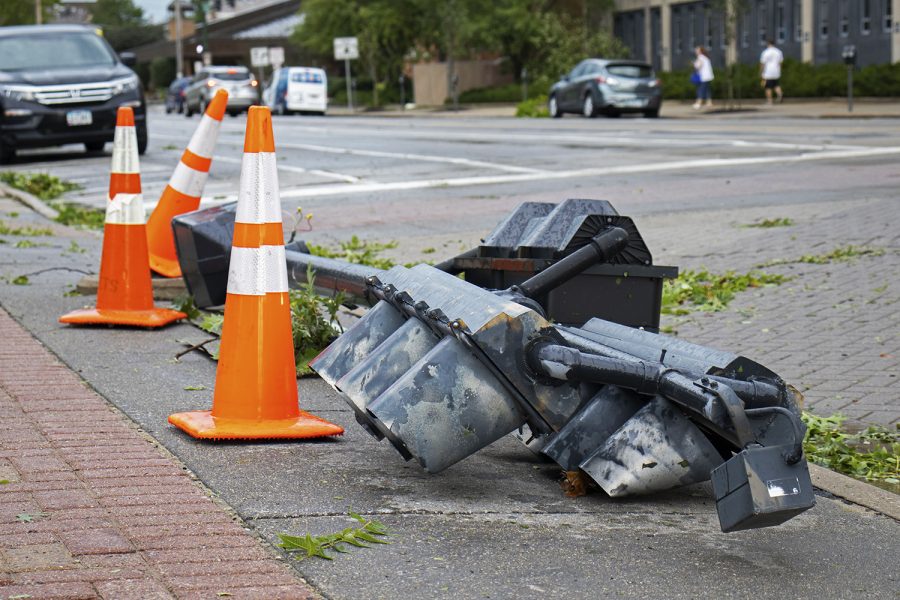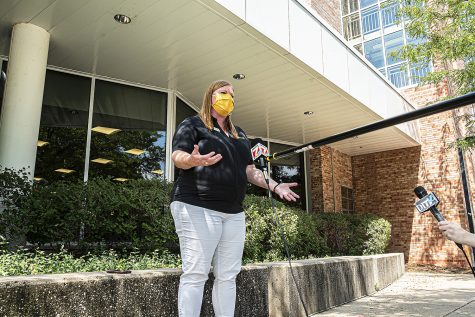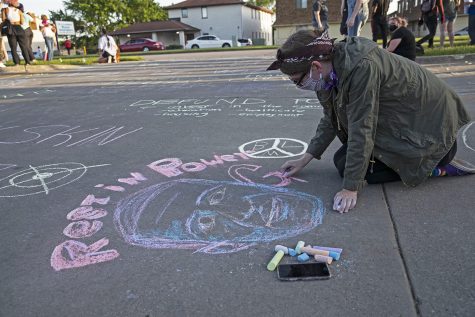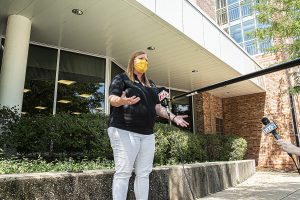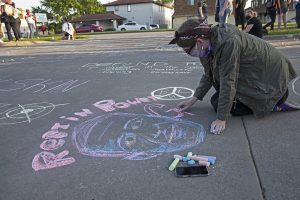Opinion | The state and federal derecho response was woefully insufficient
Federal aid to affected areas was not nearly enough, despite claims of success from President Trump.
A broken street light is seen on Monday, Aug. 10, 2020. With wind gusts around 80 mph, the derecho –a widespread wind damage event produced by severe thunderstorms– hit Iowa City in the afternoon causing tree damage and power outages.
August 26, 2020
Iowans all across the state are hurting badly after the record-breaking derecho storm that took place on Aug. 10. As crops are wiped out in gargantuan numbers and thousands of Iowans are just getting their power back, our leadership was asleep at the wheel.
In the wake of the derecho, there was home damage of over $80 million in total, with power going out in thousands of homes. These outages lasted for days on end, some for weeks. Additionally, over 40 percent of our state’s crops were damaged.
Iowa Gov. Kim Reynolds has been voicing concern, as has President Trump, but their actions tell a much different story: a story not of concern but of slow response, minimal federal funding, unwillingness to speak to activists and community organizers, and a whole lot of photo ops.
The day after the derecho hit, Reynolds had visited areas affected by storm damage, and had declared state disasters in twenty counties. For a brief moment, it seemed possible that this crisis might be met head on, with the kind of swift, broad-sweeping action required of a disaster as dire as the one that our state underwent.
But the days ticked on, organizers, activists, and local leaders fought for the safety and livelihoods of their communities with little help from the federal government.
It wasn’t until Sunday, six days after the storm hit, that Reynolds formally asked President Trump for a Presidential Major Disaster Declaration. For thousands of Iowans, these were six days without power, without shelter, without hope.
Unfortunately, very little was solved even after this declaration made its way to President Trump. It was only partially approved, with an insulting $45 million dollars being granted out of the $4 billion dollar request.
The portion of the request that President Trump did grant provided no assistance to those who suffered home damage or agricultural damage. The small amount of funds was allocated toward debris removal, as well as repair to government buildings.
Agriculture is a huge part of our state’s economy as it provides jobs for thousands of families across the state and encourages investment, which impacts everyone in Iowa, even outside of farming areas.
According to a study conducted by the Center for Agricultural and Rural Development, eight out of Iowa’s top ten exports are agricultural.
Given this, the damage to over 40 percent of our state’s crops coupled with the destruction of a huge number of grain bins and sheds poses a dire threat to the crop yield and livelihoods of Iowan farmers.
It isn’t only Iowans who should be concerned though. The national food chain could be significantly impacted by this derecho, as Iowa is the highest producer of soybeans, pork, corn, and processed grain products in the country. The availability of all these things could be heavily affected without a proper government response.
If Reynolds and Trump were to take the rebuilding of this economy seriously, they could fortify a vital industry, ensure the safety of Iowans, and protect domestic prices of various foodstuffs.
What we are instead witnessing is an unwillingness to see the enormity of this crisis and an inhumane apathy to the suffering of Iowans from those who are supposed to represent them.
Columns reflect the opinions of the authors and are not necessarily those of the Editorial Board, The Daily Iowan, or other organizations in which the author may be involved.



